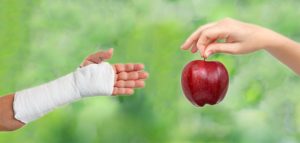
There can be many different reasons for bones to fracture, for example osteoporosis characterised by a low impact fracture with no obvious damage to skin or tissues.
Or a high energy impact fracture which would be characterised by an open trauma wound, with the crack to the bone travelling either the length or width of the bone (or both).
Whether the bone is fractured in the leg or arm, the nutritional approach would be the same, although legs may take longer to heal as they are weight-bearing compared to an arm or rib fracture for example.

Typically bone is made up of collagen (for bone flexibility), non-collagen proteins, minerals, lipids and water. Water is vital as it plays a structural role.
It is important for rehabilitation from injury to drink plenty of water each day to ensure a good blood viscosity, healthy skin, healthy tissues and efficient transportation of nutrients around the body, specifically to the injured area.
- Do you consume enough or too much protein?
- Do you regularly feel dehydrated?
- Is your diet rich in minerals such as calcium, magnesium and vitamin D?
- Do you follow a vegan or vegetarian diet?
- Are you within the correct BMI range for your height?
- Do you do any cardio or weight-bearing exercise each week?
- Are you taking any prescribed medication? Using NSAIDS such as ibuprofen to control pain?
- What is your medical history?
There are so many different factors to consider when looking at an effective rehabilitation programme.
Alcohol
Is your alcohol intake within the range set by the Government of 14 units/week? Excess alcohol has been reported to be a ‘well established risk factor for osteoporosis and bone fractures’ and will certainly have an effect on how efficiently your bones heal.
Obesity
Typically in obese adults, there is a reduction in bone quality despite an increase in bone quantity.
So it is important to know that if you are classed as obese or over weight, that even if bone quantity does increase, it is bone quality that is important. Reducing weight is vital also if the bone fracture is in the leg or foot as this area will need to be weight-bearing.
A weight-loss programme might also be relevant.
Any medication?
Prescribed medication as this can affect how fractures recover and also may indicate a possible reason for bone fragility. For example long-term intake of a PPI such as omeprazole or lansoprazole for gastritis can affect bone strength and increase possibility of fractures. They can also affect absorption of nutrients from the diet.
Anti-inflammatories (e.g ibuprofen) used to control pain may also have been prescribed after the fracture, but these can prevent bones from healing and causing a delay or impairment of the healing process.
You will need to discuss with your GP or prescriber but if anti-inflammatories have been recommended you might like to discuss a diet rich in anti-inflammatory foods. Obviously nutritional recommendations will be complementary to prescribed medication.
Dietary Advice
It is important to look at the whole person, lifestyle, dietary habits, medication and medical history to be able to create a workable and individual nutritional programme.
If you would like to know how you could improve your diet to help with your rehabilitation from injury please do contact our Registered Nutritional Therapist Caroline Rumsey who will be able to discuss this further with you. Consultations are available on request.
caroline@rumseynutrition.co.uk
07867 514584

